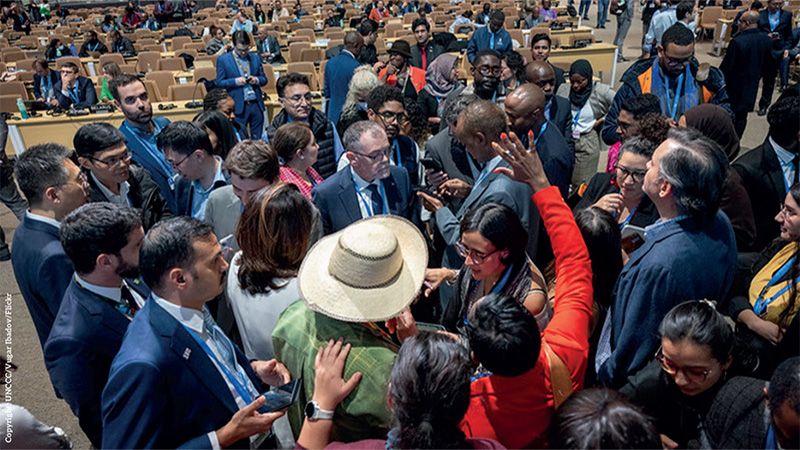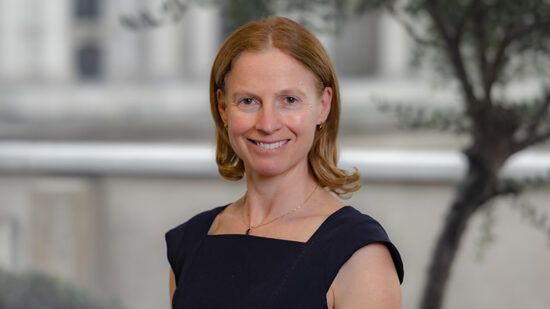The $300bn per year pledged for developing countries in the final COP29 conversations has been described as a “significant compromise” after falling well short of the $1.3trn those countries had hoped for, in a summit that saw tense negotiations and walk-outs from some nations frustrated by the diluted commitments. Some are even questioning the longevity of COP summits due to the “lack of focus” on implementing agreements made.
As part of the Baku Finance Goal, negotiators committed to channelling $1.3trn of climate finance to the developing world each year. This includes a core target for developed countries to mobilise at least $300bn per year for developing countries by 2035 – a $50bn increase on the previous draft text.
As a result, mobilising private capital is now dependent on national policymakers after the disappointing conclusion to COP29, with concerns about inflation, global events and Donald Trump’s return to the White House overshadowing conversations.
Reaction
Reacting to the final agreement, Ulrik Fugmann, co-CIO and head of investment, environmental strategies group, at BNP Paribas Asset Management, said the feedback on COP29 is somewhat dependant on what parties’ expectations were going into it.
“One real disappointment for many has been that the COP29 agenda failed to follow up on COP28’s agreement to speed up efforts to transition away from unabated fossil fuels in the power sector this decade. However, the agenda did include AI’s impact on emissions amongst others. As such, the general sentiment seems to be dissatisfaction with the general pace of decision-making.
“There has been significant debate, raised by Al Gore in a fiery speech at COP29, around the governance of the COP in its entirety and the apparent conflict in having senior oil and gas executives chairing what is an annual UN climate change conference, bringing together countries, businesses, civil society and people affected by climate change, primarily caused by energy-related activities.”
On the negotiations around the New Collective Quantified Goal, David Gorman, investment analyst at Castlefield, added: “This year’s COP seems to have been frustrating and fractious and the new deal seems to suit developed countries more than developing countries. Investors are right to be sceptical as to whether and in what form the promised $300bn is being delivered.”
Tom Tayler, head of climate finance at Aviva Investors, agreed: “The $300bn figure, and it coming from a wide variety of sources, including private capital, represents a significant compromise from developing countries from both the figures they were seeking and from the assessment of their needs.
“The Baku to Belem Roadmap to $1.3trn will now have to assess and recommend clear measures to scale up the financing for developing countries, which will need to include measures to shift the economics of the transition such that private finance flows at a much greater scale to developing countries to support their climate efforts. Private sector engagement with the roadmap process to support the design and implementation of policy and regulatory interventions that can incentivise significantly greater investment will be crucial to its success and effectiveness.”
Negotiations were said to be quite intense. As reported over the weekend, representatives from climate-vulnerable islands and African nations walked out and threatened to abandon the talks altogether, with Samoa’s minister of natural resources and environment, Toeolesulusulu Cedric Schuster, quoted as saying: “We want nothing more than to continue to engage, but the process must be inclusive. If this cannot be the case, it becomes very difficult for us to continue our involvement here at COP29.”
Zahra Hdidou, senior climate resilience specialist at ActionAid UK, branded the final agreement “a complete catastrophe and a farce”.
“With floods and droughts tearing through the Global South, the goal announced remains a drop in the ocean compared to the trillions needed to help climate-hit communities adapt and recover, especially women and girls who are among the worst impacted.”
“The $300bn boils down to mere peanuts in actual grant-based financing for those most impacted, while absolving the richest countries of their fair share – piling even more debt onto climate-affected countries. This isn’t just a shortfall; it’s a betrayal of the Paris Agreement and the Global South it promised to support in confronting the climate crisis. Our fight to make the wealthiest pay up is far from over.”
However, COP29 President Mukhtar Babayev, asserted that the Baku Finance Goal “represents the best possible deal we could reach”, and negotiators pushed donor countries as far as possible.
“When the world came to Baku, people doubted that Azerbaijan could deliver. They doubted that everyone could agree. They were wrong on both counts. With this breakthrough, the Baku Finance Goal will turn billions into trillions over the next decade. We have secured a trebling of the core climate finance target for developing countries each year.
“We have forever changed the global financial architecture and taken a significant step towards delivering the means to deliver a pathway to 1.5C.”
Shayan Ratnasingam, senior research analyst at Gravis, also offered a more positive assessment. “While COP29 may not have lived up to everybody’s expectations, there were some notable strides forward. As remarked in the closing speech by UN Climate Change Executive Secretary Simon Stiell, at COP28 the world agreed to triple renewables. At COP29 we tripled climate finance.”
The UK stepping up to take a position as a leader in climate action once again, and the finalisation of Article 6 negotiations to create and regulate a global carbon credit trading market, were also reasons to remain optimistic according to Ratnasingam.
Nonetheless, it is now up to individual governments to cover the shortfall, said Luba Nikulina, chief strategy officer at IFM Investors: “As a result of global leaders agreeing to less ambitious targets for financing climate action in developing countries, it is more important than ever that government’s put in place the policy settings to mobilise private capital to support the shortfall in a way that delivers the appropriate risk-adjusted returns for investors.”
Enforcement of agreements is critical
So, what went wrong? Tsvetelina Kuzmanova, EU sustainable finance lead at CISL Europe, noted despite the outcomes of COP29 underscoring the world’s growing expectation for the EU to lead on climate action, its presence in Baku “felt muted and indecisive”.
“Recent turbulence in Brussels has further raised questions about focus and commitment. The EU must urgently put its own house in order and step up with the decisiveness needed to drive global climate action forward.”
Meanwhile, Lloyd McAllister, head of sustainable investment and Carmignac said that if COP is to have a lasting impact, trust in the enforcement of agreements is critical.
“Undoubtedly, COP has been instrumental in the fight against climate change. Without COP, there would be no Paris Agreement and many of today’s global standards would not exist. Nevertheless, fundamental questions about its long-term role remain. Is it there to set standards, lay the foundation for legislation or impact markets?
“The reality is there is a lack of focus on incentives for applying agreements made, and implementation has been inconsistent. Enforcement of agreements is critical because we cannot rely on good faith alone to ‘get the job done’.
“To achieve the outcomes of the Paris Accord, the focus should shift to fixing market pricing failures. At present, only around 20% of global emissions are priced and the average price is very low. Three measures could help: ending fossil fuel subsidies which distort market prices and are inappropriate for such established commodities; introducing a steadily rising carbon tax to correct the basic market failure to price pollution that is offset by income tax band amendments; and introducing border adjustments, similar to those in the EU, to incentivise export markets to decarbonise.”
Despite this, Gorman added: “There’s much to dislike about COPs; the in-fighting, the commandeering of the conference by oil-rich nations and just the absurd spectacle of thousands of delegates flying thousands of miles to talk about reducing carbon emissions. All that said, COPs do get the great and the good together to talk about and hopefully take action against climate change.”
Article 6 agreement
Negotiations on Article 6, however, were more successful, with negotiators finally agreeing on the introduction of high-integrity carbon markets under the UN. According to the COP29 presidency, financial flows from compliant carbon markets could reach $1trn per year by 2050, supporting the redirection of investment to the developing world.
“Adoption of Article 6 is a historic milestone in establishing carbon market cooperation to boost ambition and mobilize urgent climate finance. However, we need critical fixes on Article 6.4 standards to ensure nature-based solutions – and the communities protecting these resources – aren’t sidelined,” commented Pedro Martins Barata, associate vice president for carbon markets and private sector decarbonisation at the Environmental Defense Fund.
“The Article 6.4 Supervisory Board must get these standards right, which may require further refinements in 2025. These standards must prioritise robust engagement with Indigenous Peoples and local communities. Climate justice and social safeguards can’t be afterthoughts – they are fundamental to the success and fairness of these mechanisms.”








